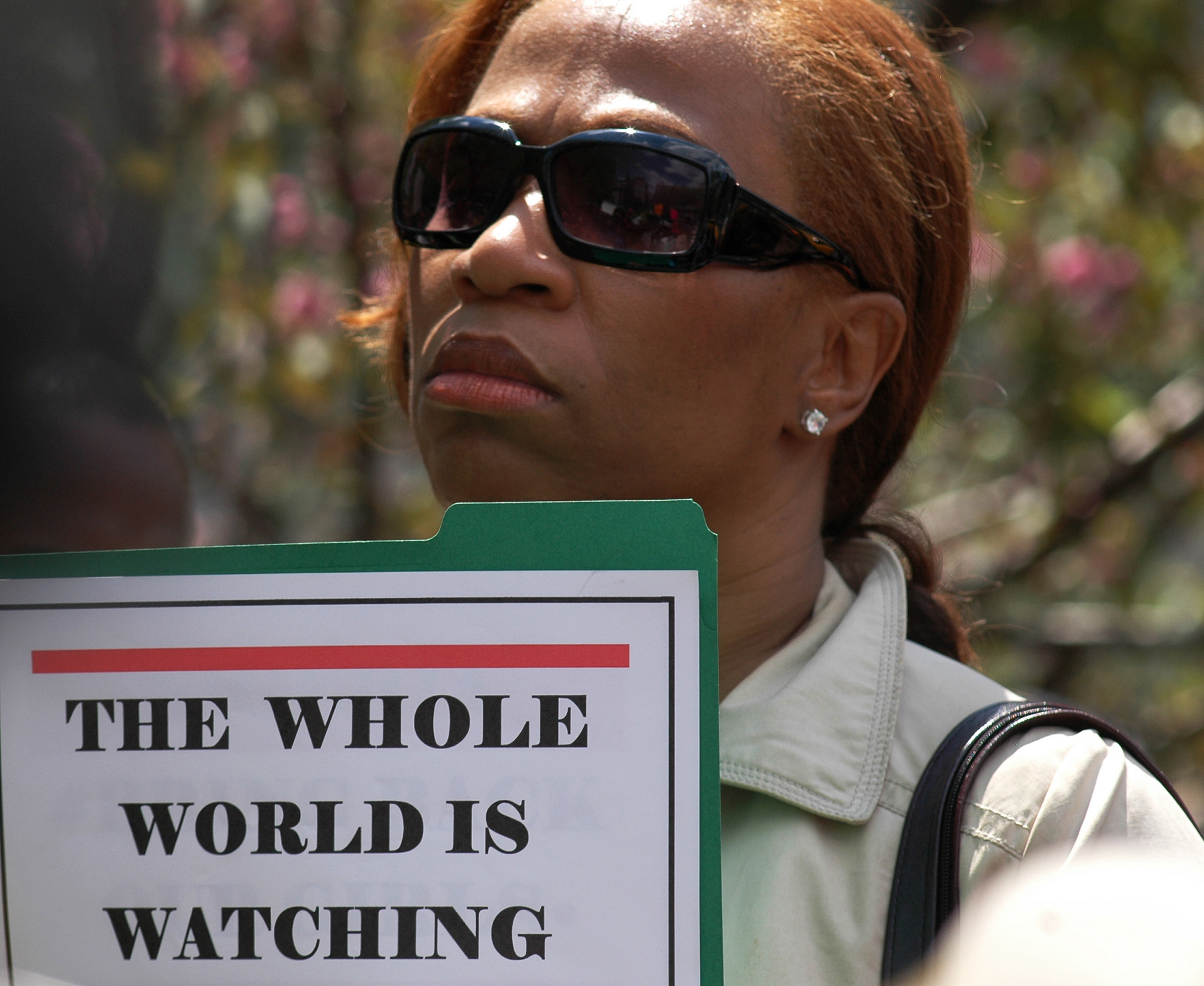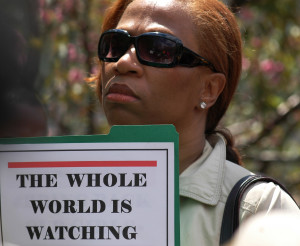Nigerian Government Bombs Refugee Camp: Another Failed Attempt at Defeating Boko Haram
 Protesters gathering in Times Square for the Bring Back Our Girls Campaign. https://flic.kr/p/nv5U9R
Protesters gathering in Times Square for the Bring Back Our Girls Campaign. https://flic.kr/p/nv5U9R
After nearly a decade of fighting a bloody insurgency against this militant group, the Nigerian government has made yet another disastrous attempt at putting forward its agenda to defeat Boko Haram, a jihadist organization that in the past few years has taken up increasingly violent militant tactics in its war against the Nigerian state.
Last week, the Nigerian military was ordered to bomb the village of Rann, an area populated with 20,000 to 40,000 refugees fleeing Boko Haram attacks, because it was suspected of being occupied by members of the organization. As a result, hundreds of people in Rann were killed. Commanders immediately apologized for the “accidental” bombing, explaining that it was because of the “fog of war.” However, the casualties attributed to this bombing can clearly not be brushed off as a “mistake” when it was common knowledge that the grounds were populated densely with refugees. If there were members of the jihadist organization on site, these refugees would have surely been seen as collateral damage.
This is not to say that the military necessarily intentionally killed hundreds of refugees; however, both the inadvertent attack itself and the aftermath of the bombing does serve to reveal the government’s negligence towards building sufficient infrastructure to ensure the protection and livelihood of its citizens.

Perhaps if there was a minimum basis of health facilities for people to turn to, the death toll of this bombing could have been contained. As it stands now, however, there is very little health infrastructure in place for these victims to rely on in times of emergency. This absence of health facilities has led to continuing death and injury after the bombing and eventually drove the Red Cross to intervene and distribute food to nearly 30,000 people. As a representative for the Red Cross described, “[p]eople in Rann… have been isolated by rains and poor quality roads since June and running very low on food supplies.” Due to a lack of health infrastructure, injured victims were predicted to have died shortly after the attack or, as Temie Giwa-Tubosun grimly puts it, “[t]t’s likely injured victims didn’t get access to aid and emergency services like blood. In cases like this, people who should have lived won’t survive because we don’t have a proper health system.”
Indeed, this kind of crime is not out of character for the government of Nigeria. This is the second major incident where the Nigerian government has done a disservice to its people in attempts to defeat Boko Haram.
In 2009 the government began a bloody purge of Boko Haram members and all suspects in Maiduguri, the capital of Borno State in northeastern Nigeria. Dozens of people were rounded up and slaughtered without trial, in a governmental display of power at the price of innocent civilians, including children, being murdered. As a result many civilians fled Nigeria. Who is to say that the most recent bombing of refugees is not an act of the same nature? In this way, between a government who has abandoned its responsibility of tending to the needs and security of its people and a militant group launching reckless attacks on citizens at large, the people of Nigeria have little elsewhere to turn.
Meanwhile, in 2010 poverty rates rose to over 60%, while unemployment rates rested at 20% despite a massive influx of oil wealth within the country. The Nigerian government thus proves no more reliable for Nigerian citizens than the jihadist group, not only in regards to their economic livelihoods, but also in regards to the level of violence that the government responds with in the wake of Boko Haram attacks. By responding to the terrorist organization with equal levels of violence and careless murder like its most recent bombing and its slaughter in 2009, the government is losing the chance to regain its legitimacy as the reliable centre of power for Nigeria. More importantly, Nigeria uses Boko Haram as leverage to receive weapons from Pakistan and Russia. However, the real purpose for these weapons being sold to the Nigerian government is to hopefully defend its “war on terrorism” and its own broader form of terrorism on its civilians.
In its response to the bombing of Rann, the Red Cross has brought in enough food to last five weeks. While this aid is momentarily beneficial, it is hardly sustainable without the Nigerian government stepping up to assist the victims of its own flawed war strategy. To ameliorate the situation, on the international scene, actors should divest from the Nigerian government’s genre of war tactics against Boko Haram and focus instead on ensuring the safety of the Nigerian people and rebuilding institutions. Without these changes stemming from the Nigerian government and regional actors, Nigeria is without a centre of power in fighting Boko Haram and protecting the Nigerian people. Nigeria’s war tactics are not only destructive towards human rights within the country, they are drastically driving the regime away from building a strong state. With its erratic military commands, decentralization of power, and worsening public perception among citizens of Nigeria and regional territories, Nigeria is in serious danger of imploding into a failed state.
